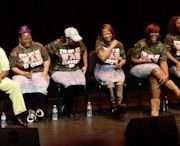THE JONES FAMILY SINGERS
THE JONES FAMILY SINGERS
Pepperdine University – Friday, February 5, 2016
From Russia to Malibu with Love
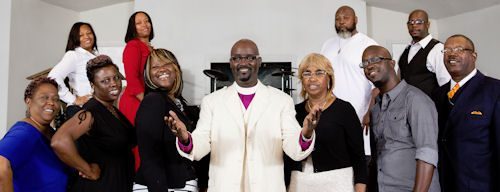 Russians don’t speak much English; they knew only a few words, but they really needed only one to understand the nine-member African-American Jones Family Singers: Jesus. In an hour and a half part concert-part revival meeting they would have heard many times—as many times as Bruce Springsteen will sing Born in the USA, the Jones Family Singers will sing Come to me, Jesus! to the same effect—one powerful mantra that sums up their entire message. It had the whole audience—including your Jewish correspondent—at this Christian university in Malibu standing up and clapping, dancing and singing along.
Russians don’t speak much English; they knew only a few words, but they really needed only one to understand the nine-member African-American Jones Family Singers: Jesus. In an hour and a half part concert-part revival meeting they would have heard many times—as many times as Bruce Springsteen will sing Born in the USA, the Jones Family Singers will sing Come to me, Jesus! to the same effect—one powerful mantra that sums up their entire message. It had the whole audience—including your Jewish correspondent—at this Christian university in Malibu standing up and clapping, dancing and singing along.
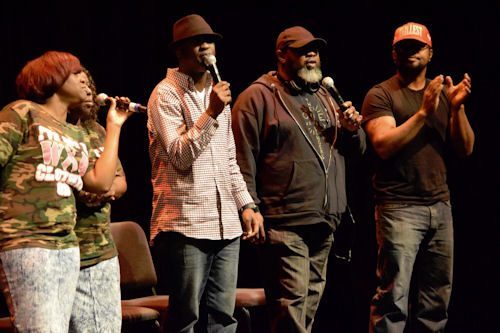 If you like Gospel music you were in the right place at the Smothers Theatre—they came with the recommendation of Rolling Stone Magazine from their hit performance at SXSW and earned every plaudit. Jill Fenimore—like most in their well-attended concert—a sensible, self-contained devout but undemonstrative non-denominational Christian—suddenly felt the Holy Spirit of a real four-square Pentecostal Holy Roller “Rockin’ for Jesus and Rollin’ for the Holy Ghost” enter their otherwise dignified bodies and raise them up from their seats in religious fervor—shouting and jumping for Glory. It was a beautiful thing to witness. I was half-expecting to hear someone speaking in tongues, but it stopped just short of that. They made the “gospel choir” of the recently reviewed play The Christians at the Mark Taper Forum seem very proper and tame by comparison. This was Gospel music to raise the dead—this may have been why Jesus left the tomb on Easter Sunday. It was glorious and above all—it was fun. I didn’t have to believe in it to enjoy every minute of it nonetheless.
If you like Gospel music you were in the right place at the Smothers Theatre—they came with the recommendation of Rolling Stone Magazine from their hit performance at SXSW and earned every plaudit. Jill Fenimore—like most in their well-attended concert—a sensible, self-contained devout but undemonstrative non-denominational Christian—suddenly felt the Holy Spirit of a real four-square Pentecostal Holy Roller “Rockin’ for Jesus and Rollin’ for the Holy Ghost” enter their otherwise dignified bodies and raise them up from their seats in religious fervor—shouting and jumping for Glory. It was a beautiful thing to witness. I was half-expecting to hear someone speaking in tongues, but it stopped just short of that. They made the “gospel choir” of the recently reviewed play The Christians at the Mark Taper Forum seem very proper and tame by comparison. This was Gospel music to raise the dead—this may have been why Jesus left the tomb on Easter Sunday. It was glorious and above all—it was fun. I didn’t have to believe in it to enjoy every minute of it nonetheless.
To me it was a new way to celebrate Black History Month—which began 90 years ago in 1926 as Black History Week and then grew into a month—no mention of Frederick Douglass or Nat Turner, no reference to slavery or shackles—just a pure demonstration of what the Bible commanded when the Lord said “Make unto me a Joyful Noise.” The African-American church tradition—both in terms of sermon and music—is what Dr. Martin Luther King, Jr. built upon to create the Civil Rights Movement. It’s where the great freedom songs came from—the Negro Spirituals—and it’s where the Montgomery Bus Boycott started in 1955—in the church where this young minister held forth with a new kind of black sermon—using Rosa Parks defining existential act of protest in refusing to move to the back of the bus as the theme of his homily to organize support for the boycott—all the way to the Riverside Church in New York City on April 3, 1967 where he gave his historic anti-Vietnam War speech—the one that ended by saying “the most violent nation on earth today is my own country”—to that fateful night just one year later where he said “I Been to the Mountaintop” in his last sermon in a Memphis church—before being slain on the balcony of the Lorraine Motel just before midnight. He died after midnight so his assassination is recorded as on April 4, 1968, just hours after he told the people “I may not get there with you, but I have seen the Promised Land.”
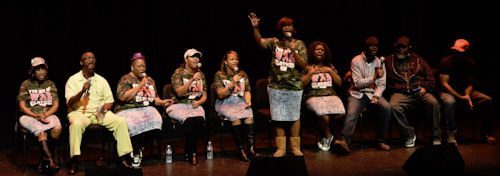
The Jones Family Singers don’t have to recount this history—they embody it in their very presence. At a time when we hear from the lingering intractable forces of racism in America about “the crisis” in the “Black American family,” they should have been in this college theatre with us to see an entire family of wonderful artists preach to the audience a powerful message, “a family that prays together stays together.” “We’re not here to just entertain you,” said their father on behalf of his eight children, six daughters and two sons, “We’re here to minister to you and serve you”—as good a definition of folk music as I have ever heard. That’s what Pete Seeger did, a secular deacon if there ever was one. The message on his long-neck five-string banjo—This Machine Surrounds Hate and Forces It to Surrender—is a statement of faith, not technically religious perhaps, but a statement of faith nonetheless. Pete was preaching love—for everyone on Planet Earth—through his music and his political beliefs:
One blue sky above us
One ocean lapping all our shores
One earth so green and round
Who could ask for more
And because I love you
I’ll give it one more try
To show my rainbow race
It’s too soon to die.
And the greatest song he helped shape into the civil rights anthem We Shall Overcome also came out of the black church spiritual tradition—the one he taught to Dr. King in the back seat of a car on the way to a protest rally in 1962. Dr. King liked it so much he asked Pete to sing it after King spoke, and afterwards summed up its universal appeal, “Pete, that song really sticks to you.” By the time of the March on Washington in 1963 We Shall Overcome had made its way out of the churches and into the jails and marches of the freedom movement—and to the National Mall, where Joan Baez sang it August 28.
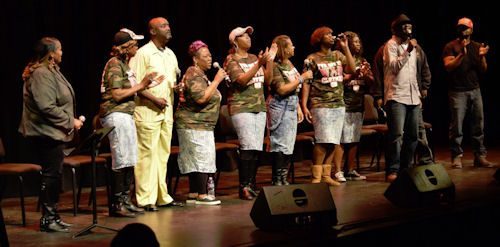
The Jones Family Singers come out of this same black church tradition, and bring its folk bearings into the modern era. They combine Gospel, Folk, and R&B into one seamless performance—where a new gospel song of their own making suddenly opens up into the Ben E. King classic Stand By Me. A few minutes later their musical sermon of love for Jesus suddenly merges with the Jackie De Shannon hit What the World Needs Now Is Love. They integrate the religious and the popular into a unified field theory of spiritual affirmation—an amazing act of creative appropriation—leaving me never quite knowing where the boundaries between the two reside. The result reveals how closely related they actually are—songs we think of as secular and popular may profoundly grow out of the gospel roots they only nominally abandon, and songs we think of as spiritual and gospel at their core may do exactly what Lead Belly claimed: “Rock church.”
Indeed, in Lead Belly’s great performance of one such song, Let It Shine On Me, he takes an Underground Railroad coded spiritual about the use of lighthouses along the coast of South Carolina as signaling stations to let fleeing slaves know if there might be sanctuary at the nearby farm and shows how the song would be sung in different churches. He starts the song out as a slow line-out hymn from a Methodist Church:
Let it shine on me
Let it shine on me
Let the light from the lighthouse
Shine on me
Let it shine on me
Let it shine on me
Let the light from the lighthouse
Shine on me.
(If the lighthouse was lit that meant you could stay the night at the farm on your way north to freedom.) But then Lead Belly picks the tempo up, adds a little rhythm to it and lets you hear how it would sound “in a Baptist Church.” And finally, when you have gotten the hang of it, he gives it the musical form of a rock-and-roll beat—his “Rock church”—and says “This is how the Holy Rollers do it.” Only then does Lead Belly incorporate the chorus of Amazing Grace, sung in a way you never heard Judy Collins or Joan Baez sing it:
Amazing grace
how sweet the sound
That saved a wretch like me
I once was lost but now I’m found
Was blind but now I see
with his 12-string guitar and metal thumb pick going at full tilt.
That’s where the Jones Family Singers would pick it up and take it yet a further step without apology into the un-abandoned world of rock-and-roll—with electric guitar, electric bass and a full Ringo Starr-style drum kit. To set the scene, imagine Ed Sullivan in his dour expression and button-down suit suddenly break into “Ladies and Gentlemen, The Jones Family Singers!”
For as the Beatles sang, in the very same spirit and with the very same message as the Jones Family Singers: All You Need Is Love. Call it the gospel of rock-and-roll.
The difference, of course, is that the Jones Family Singers are not—as John Lennon once claimed—“more popular than Jesus.” Nor do they want to be—they are here to serve their master, not surpass him. The two brothers and one extra-family member, their drummer, provide the brilliant instrumental accompaniment that sustains and embroiders their five sisters sometimes searing vocals and hip-shaking dance moves.

Had they actually been on the Ed Sullivan Show they would have been just as censored as Elvis—with the camera permitted to photograph only their upper bodies.
Let me introduce the band: Theresa Patrelle Jones aka “Lady T” sings baritone for The Jones Family Singers. Velma “Mice” Davis sings 1st and 2nd soprano; Sabrina Freeman is the next to oldest daughter of Bishop and Lady Sarah Jones and sings top vocal in the group. Kenneth Jones is their oldest son and plays bass for the band; Ernestine Ray is their oldest daughter and sings alto; Fred Allen Jones, Jr. is lead guitarist and their youngest son; Alexis Jones is the lead singer of the Jones Family Singers and baby daughter of Bishop Fred A. Jones, Sr. and First Lady Sarah Jones; Duane Edward Hebert is the drummer for the group. Bishop Fred A. Jones, Sr. Th.D. is pastor/founder of The Mt. Zion Pentecostal Cathedral of Markham, TX and CEO of Family-Styled Records.
In addition to breaking musical boundaries between gospel and pop, folk and rock, they break the oldest wall of all—the fourth wall between stage and audience. Their lead singer—whose voice soars as high as Diana Ross in her most thrilling moments—comes out into the audience, shakes our hands and gets us up on our feet; their father walks up and down the aisles like I once saw Yevtushenko do at a poetry reading in Claremont and transforms a fully-staged concert into a living room visit or back-porch social. In short, they connect with us—in any way they can. They immerse us into the experience of gospel, both music and personal. You may never hear them again, but you will never forget the one time you did. They are the one-and-only Jones Family Singers. They earned a standing ovation at the Lincoln Center and at the Kennedy Center—and here they are at a distant outpost of American culture in Malibu—and giving it all they’ve got, just like they did last year in the Playboy Jazz Fest at the Hollywood Bowl and at the Newport Folk Festival—where they performed on the 50th anniversary of Dylan going electric.”
They recently returned from a fourteen day tour of Russia, where they can’t speak the language and most of their audience could speak but a few words of English—but the language barrier fell just as hard as the fall of communism in 1989, beneath their human determination to reach out and touch everyone who had taken the trouble to come and hear them. They weren’t singing to us as an audience, they sing every song as one person to another. And as they remind us more than once, “We came all the way from Texas to get here, and while we are here we are going to stand up for Jesus! …I got the praise, you got the praise; who you going to give it to? Jesus! …Get on the train of love!”
But all is not joy and jubilation—even at this unalloyed Gospel concert. Halfway through their show Bishop Fred A. Jones, Sr. suddenly stops and asks the audience if any of us have ever been depressed. Have any of us had hard times? Do any of us know anything about the blues? And sure enough, from out of the blue they down-shift musical gears and connect with yet another note of the Black Experience—and give it their own twist; it is fabulous, the most musically innovative song of the night, The Christian Blues.
I got Jesus tonight
He’s all I need
When trouble comes
I get down on my knees.
Their lead guitarist plays the blues as well as John Mayall and their father sings his Christian Blues with all the desperation of Robert Johnson facing the devil at the Crossroads.
That powerful blues testament is the real answer to the theological debate which animated The Christians—the religious drama Jill and I saw at the Mark Taper Forum last December. Their pastor preaches the opening sermon advocating getting rid of the devil, getting rid of hell—and sticking to the uncomplicated optimism of the Christian who needs only Heaven to prosper. But that’s like John Wayne in a western with no bad guy. The Gospel according to the Jones Family Singers recognizes the need for the devil—for Hell—and sings the blues with the same passion as their “good news”—i.e., the Gospel—for as Jill reminds me that is what makes the Christian drama so powerful.
We’ve been to a number of gospel concerts now—and the Jones Family Singers is the first and only one that includes the blues in its repertoire. It sets them apart from all the smiley-faced nothing-but-praise-the-lord gospel music that surrounds them. Their music does not turn a blind eye to human suffering; it is thus fully human in its willingness to face the fact of evil in the world. For a Jew—who cannot avoid the history of the Holocaust even if he wanted to—this is Christian folk music that embraces all people and speaks to me with eloquence and compassion—just like it spoke to the Russians on their tour who had survived Communism’s 72-year doomed attempt to outlaw God. That is why music is the language of brotherhood—and why if there is a family of man, music is its universal language. It’s the language of the Jones Family Singers, and why I had no trouble understanding it. They are ambassadors of peace and goodwill as well as Jesus—from Russia to Malibu with love. Stand by me.
The images above are from a Convocation Event with Pepperdine students that the Jones Family Singers held earlier in the day.
Los Angeles folk singer Ross Altman, PhD may be reached at greygoosemusic@aol.com

